高考英语二轮复习课件:句子(共46张PPT)
文档属性
| 名称 | 高考英语二轮复习课件:句子(共46张PPT) |  | |
| 格式 | zip | ||
| 文件大小 | 105.7KB | ||
| 资源类型 | 教案 | ||
| 版本资源 | 通用版 | ||
| 科目 | 英语 | ||
| 更新时间 | 2019-08-01 21:22:42 | ||
图片预览

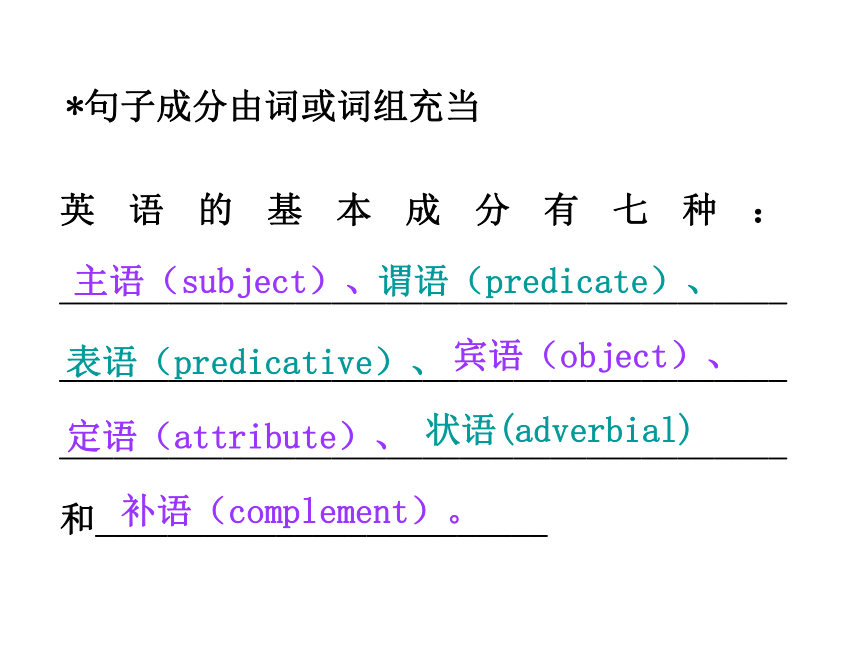
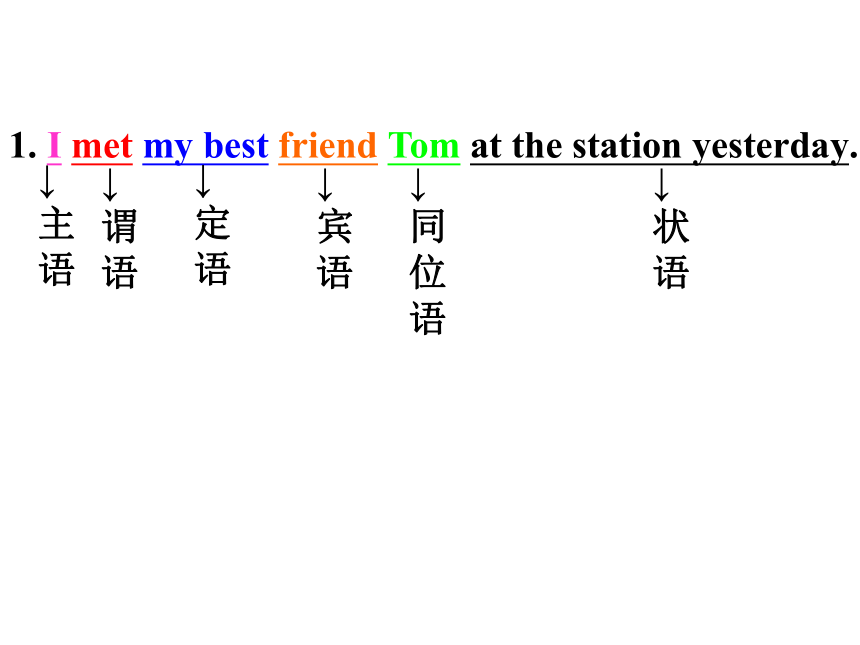
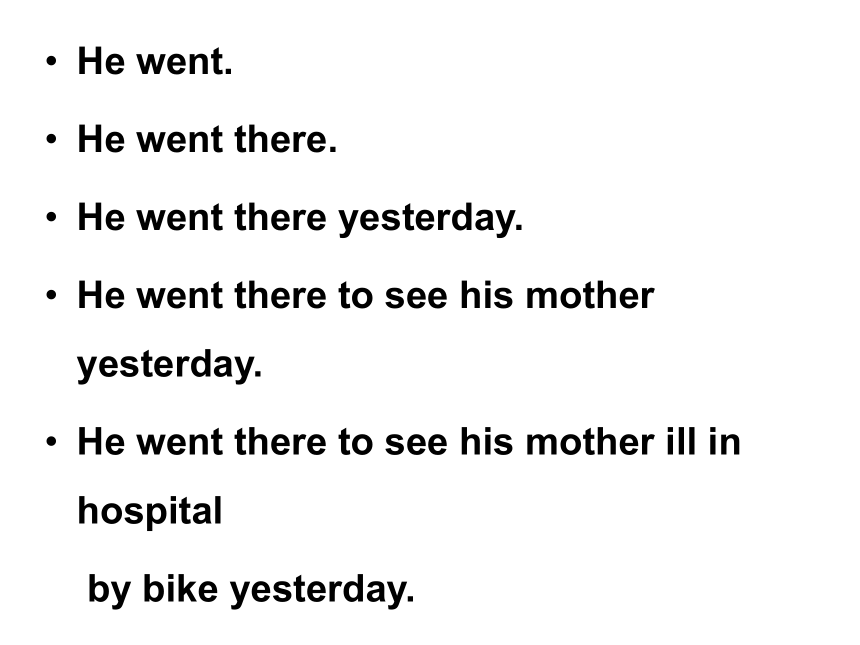
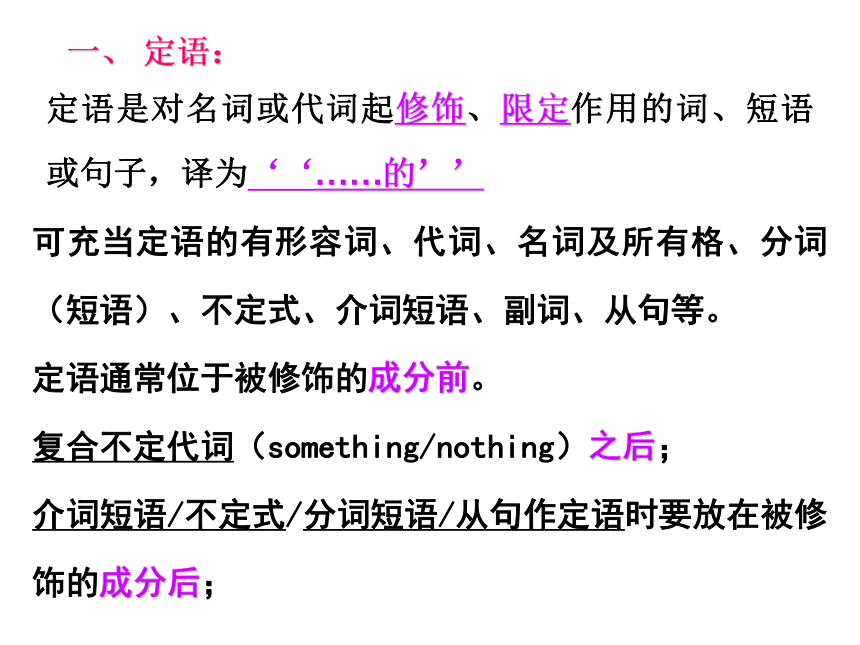
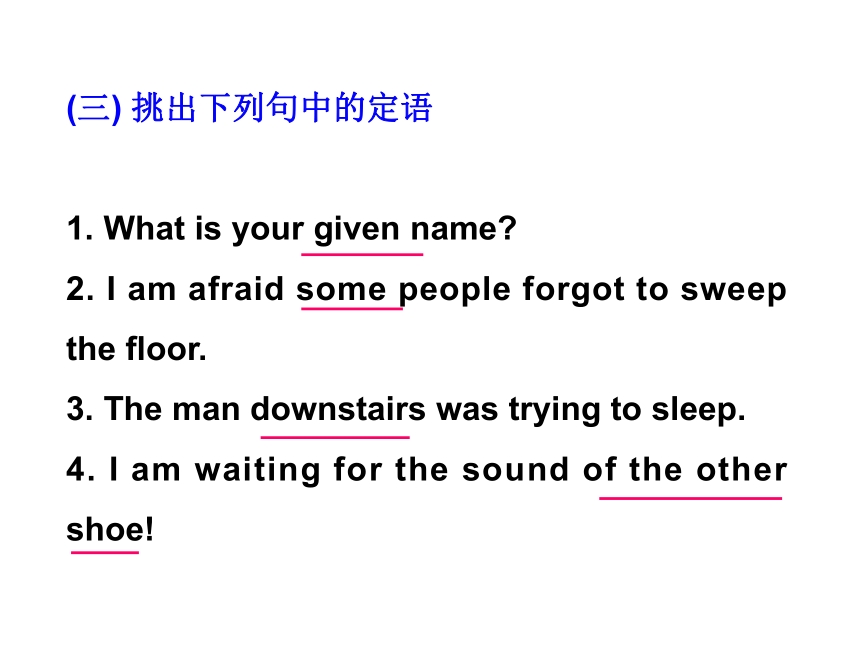
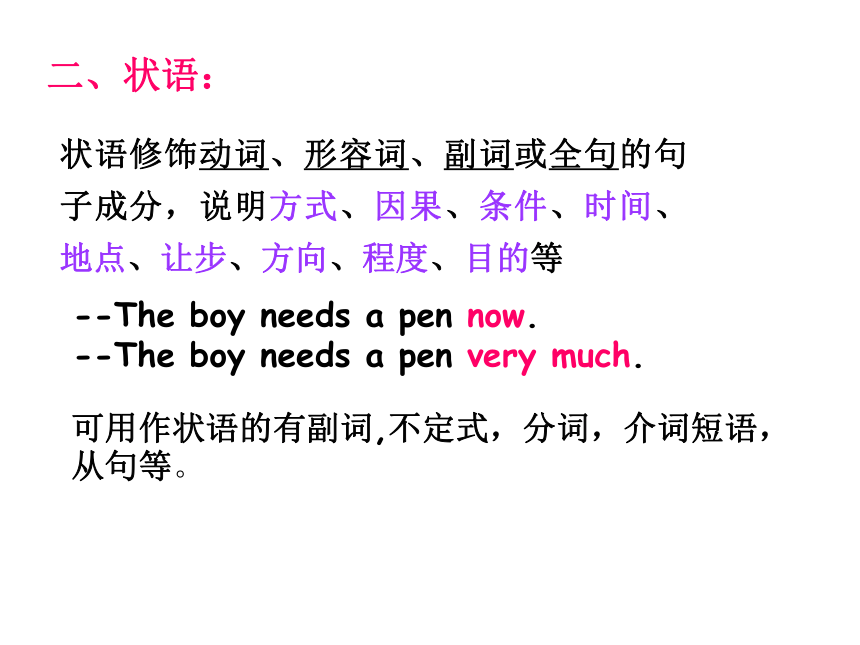
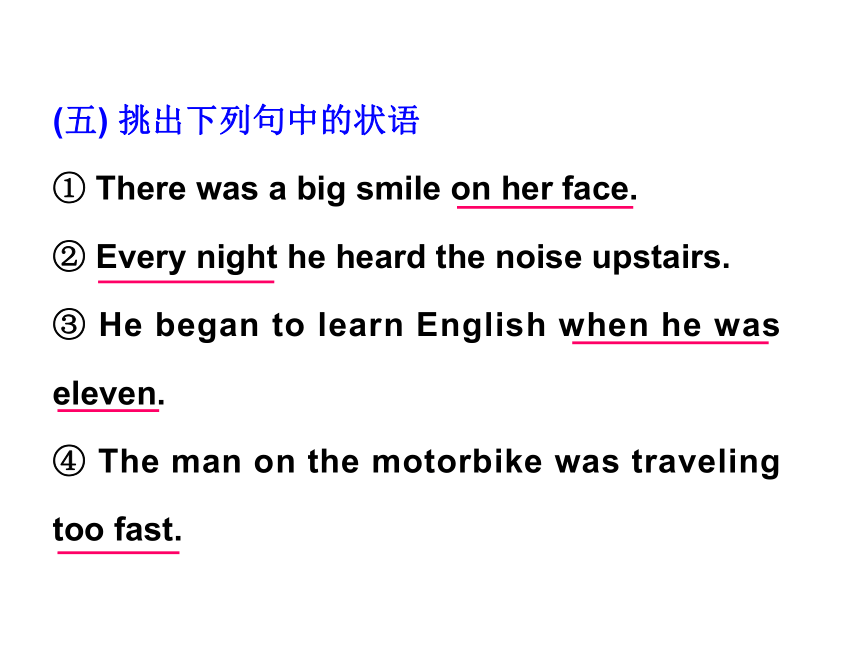
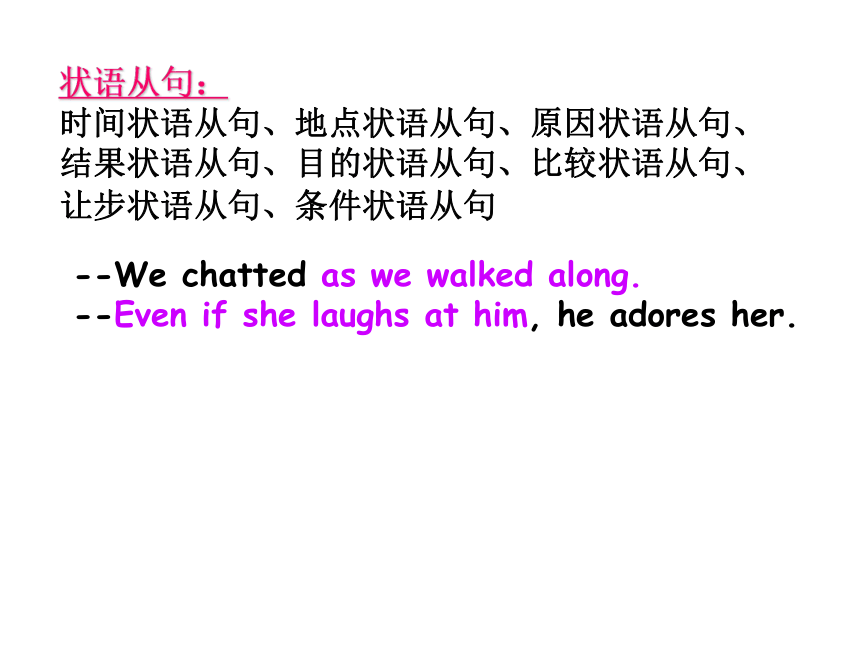
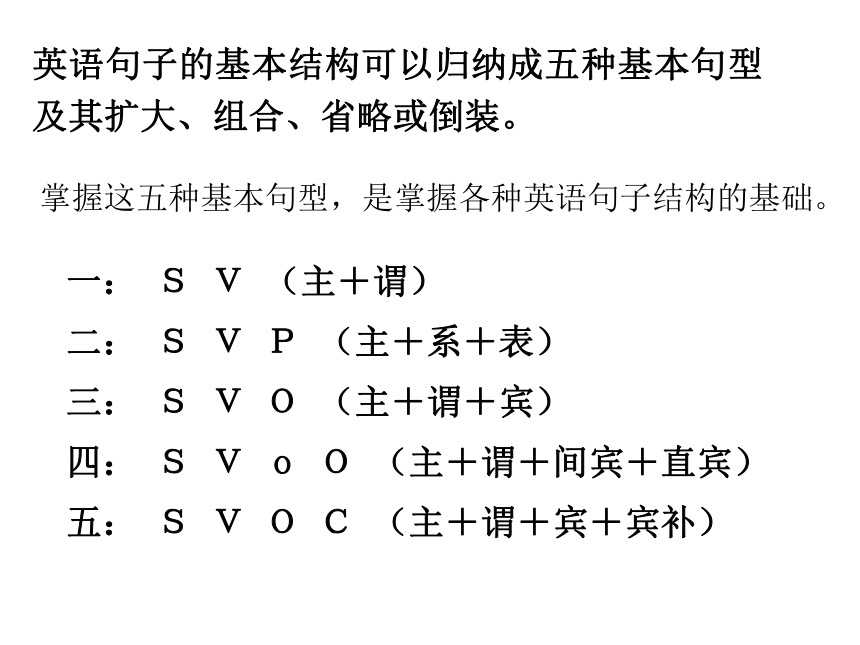
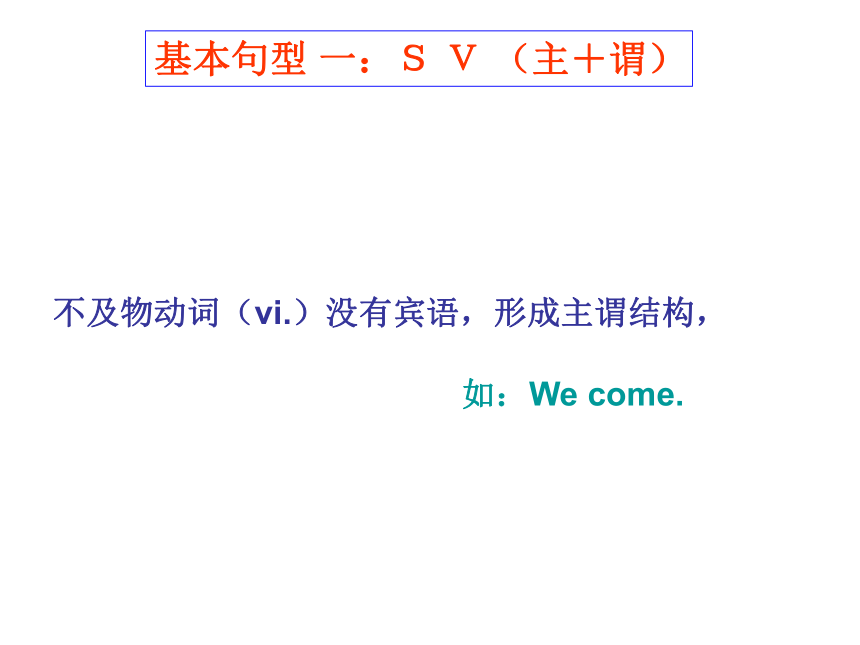
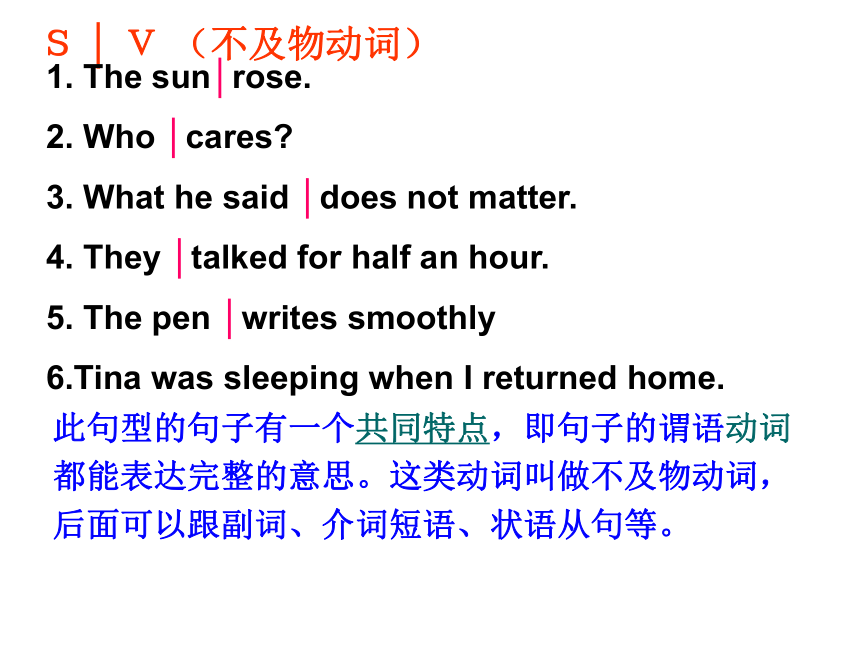
文档简介
课件46张PPT。英语专题:复习句子成分
*句子成分由词或词组充当英语的基本成分有七种:________________________________________________________________________________________________________________________和_________________________主语(subject)、谓语(predicate)、表语(predicative)、宾语(object)、定语(attribute)、状语(adverbial)补语(complement)。1. I met my best friend Tom at the station yesterday.↓
主语
↓
谓
语↓
定语↓
宾
语↓
同位语↓
状
语He went.
He went there.
He went there yesterday.
He went there to see his mother yesterday.
He went there to see his mother ill in hospital
by bike yesterday.一、 定语:定语是对名词或代词起修饰、限定作用的词、短语或句子,译为‘‘……的’’可充当定语的有形容词、代词、名词及所有格、分词(短语)、不定式、介词短语、副词、从句等。
定语通常位于被修饰的成分前。
复合不定代词(something/nothing)之后;
介词短语/不定式/分词短语/从句作定语时要放在被修饰的成分后;
(三) 挑出下列句中的定语
1. What is your given name?
2. I am afraid some people forgot to sweep the floor.
3. The man downstairs was trying to sleep.
4. I am waiting for the sound of the other shoe!二、状语:状语修饰动词、形容词、副词或全句的句子成分,说明方式、因果、条件、时间、地点、让步、方向、程度、目的等--The boy needs a pen now.
--The boy needs a pen very much.可用作状语的有副词,不定式,分词,介词短语,
从句等。 (五) 挑出下列句中的状语
① There was a big smile on her face.
② Every night he heard the noise upstairs.
③ He began to learn English when he was eleven.
④ The man on the motorbike was traveling too fast.状语从句:
时间状语从句、地点状语从句、原因状语从句、
结果状语从句、目的状语从句、比较状语从句、
让步状语从句、条件状语从句 --We chatted as we walked along.
--Even if she laughs at him, he adores her.英语句子的基本结构可以归纳成五种基本句型及其扩大、组合、省略或倒装。掌握这五种基本句型,是掌握各种英语句子结构的基础。一: S V (主+谓)
二: S V P (主+系+表)
三: S V O (主+谓+宾)
四: S V o O (主+谓+间宾+直宾)
五: S V O C (主+谓+宾+宾补)
基本句型 一:S V (主+谓)不及物动词(vi.)没有宾语,形成主谓结构,
如:We come.S │ V (不及物动词)1. The sun│rose.
2. Who │cares?
3. What he said │does not matter.
4. They │talked for half an hour.
5. The pen │writes smoothly
6.Tina was sleeping when I returned home.此句型的句子有一个共同特点,即句子的谓语动词
都能表达完整的意思。这类动词叫做不及物动词,
后面可以跟副词、介词短语、状语从句等。
基本句型 二: S V P (主+系+表)这类动词叫做连系动词。系动词分两类:be, look, keep, seem等,表情况;get, grow, become, turn等属另一类,表变化。
be 本身没有什么意义,只起连系主语和表语的作用。其它系动词仍保持其部分词义。感官动词多可用作连系动词:look well/面色好, sound nice/听起来不错,feel good/感觉好,smell bad/难闻 taste delicious/味道美S │V(是系动词)│ P(表语) 1. This │is │an English-Chinese dictionary.
2. The dinner │smells │good.
3. He │fell │in love.
4. Everything │looks │different.
5. He │is growing │tall and strong.
6. Our well │has gone │dry.
7. His face │turned │red. 基本句型 三: S V O (主+谓+宾)此句型句子的共同特点是:谓语动词都具有实义,都是主语产生的动作,但不能表达完整的意思,必须跟有一个宾语,即动作的承受者,才能使意思完整。这类动词叫做及物动词。S │V(及物动词)│ O(宾语)1. Who │knows │the answer?
2. He │has refused │to help them.
3. He │enjoys │reading.
4. He │said │"Good morning."
5. He │admits │that he was mistaken. 基本句型 四: S V o O (主+谓+间宾+直宾)有些及物动词可以有两个宾语,eg:give/pass/bring/show。这两个宾语通常一个指人(间接宾语);一个指物(直接宾语)。--Give me a cup of tea please.
--Show this house to Mr. Smith.
--Bring it to me, please.
S │V(及物)│ o(多指人) │ O(多指物)She │ordered │herself │a new dress.
2. He │brought │you │a dictionary.
3. I │showed │him │my pictures.
4. I │told │him │that the bus was late.
5. He │showed │me │how to run the machine. 基本句型 五: S V O C (主+谓+宾+宾补)此句型的句子的共同特点是:动词虽然是及物动词,但是只跟一个宾语还不能表达完整的意思,必须加上一个补充成分来补足宾语,才能使意思完整。宾语补足语:位于宾语之后对宾语作出说明的成分。可以用作宾语补足语的有名词,形容词,不定式,动名词,分词,介词短语等。
The war made him a soldier.
New methods make the job easy.
I often find him at work.
The teacher ask the students to close the windows.
I saw a cat running across the road.名词/代词宾格 + n./adj./ 介词短语/动词不定式/分词S │V(及物)│ O(宾语) │ C(宾补) 1. They │painted │the door │green.
2. This │set │them │thinking.
3. They │found │the house │deserted.
4. He │asked │me │to come back soon.
5. I │saw │them │getting on the bus. a,S V b, S V P c,S V O
d,S V o O e,S V O C 1,Pleas tell us a story._______
2, She smiled.______
3. I have a lot work to do._____
4. His job is to train swimmers._____
5. He noticed a man enter the room._____
6. Please look at the picture._____daebec但常用的英语句子并不都象基本句型这样简短,除了基本句型的成分不变外,通常是在这些成分的前面或后面增加一些修饰语而加以扩大。这些修饰语可以是单词(adj./adv./num.数词)短语(主要是介词短语、不定式短语和分词短语)。我们称之为:定语、状语
The little boy needs a blue pen.
Two boys need two pens.
His name is Tom.
The boy in blue is Tom.
The boy there needs a pen.
He tried to write poetry in his off time.
The boy needs a ball pen.
There is nothing to do today.
The pen bought by her is made in China.
The boy you will know is Tom.
In the classroom, the boy needs a pen.
在教室里,男孩需要一支钢笔。 (地点状语)
Before his mother, Tom is always a boy.
在母亲面前,汤姆总是一个男孩子.(条件状语)
On Sundays, there is no student in the classroom.
星期天,教室里没有学生.(时间状语) 介词短语作状语:
He sits there, asking for a pen.
他坐在那儿要一支笔。(表示伴随状态)
Having to finish his homework, the boy needs a pen.
因为不得不完成作业,男孩需要一支笔。(原因状语)
Frightened, he sits there soundlessly.
(因为)受了惊吓,他无声地坐在那儿。(原因状语)分词(短语)作状语:
The boy needs a pen to do his homework.
男孩需要一支笔写家庭作业。(目的状语)
To make his dream come true, Tom becomes very interested in business.
为实现梦想,汤姆变得对商业很有兴趣. 不定式作状语:三、同位语:同位语 当两个指同一事物的句子成分放在同等位置时,一个句子成分用来说明和解释另一个句子成分,这个句子成分就叫做它的同位语。
We students should study hard.
(students是we的同位语,都是指同一批‘学生’)
We all are students.
(all是we的同位语,都指同样的‘我们’)
四、独立成分:与全句没有语法关系的句子成分叫做句子的独立成分
感叹词:oh, hello, aha, ah,等。
肯定词:yes
否定词:no
称呼语:称呼人的用语。
插入语:一些句中插入的I think , I believe等。
如: The story, I think, has never come to the end. 我相信,这个故事还远没结束.
一) 挑出下列句中的宾语
① My brother hasn't done his homework.
② People all over the world speak English.
④ How many new words did you learn last class?
⑤ Some of the students in the school want
to go swimming, how about you?
⑥ The old man sitting at the gate said he was ill.(二) 挑出下列句中的表语
-- The old man was feeling very tired.
-- The leaves have turned yellow.
-- Soon They all became interested in the subject.(四) 挑出下列句中的宾语补足语
① She likes the children to read newspapers and books in the reading-room.
② He asked her to take the boy out of school.
③ She found it difficult to do the work.
④ They call me Lily sometimes.
⑤ I saw Mr Wang get on the bus.⑤ With the medicine box under her arm, Miss Li hurried off.
⑥ She loves the library because she loves books.
⑦ I am afraid that if you've lost it, you must pay for it.
⑧ The students followed Uncle Wang to see the other machine.划分句子成分You will tell your friend that you’ve got to school.
But as the moon gave far too much light, I didn’t dare open a window.
3. Another time five months ago, I happened to be upstairs at dusk when the window was open.
4. The dark, rainy evening, the wind, the thundering clouds held me entirely in their power.1.You will tell (your) friend that you’ve got to school.
2. But [as the moon gave far too much light], I didn’t
dare open a window.
3. [Another time five months ago], I happened to be
Upstairs [at dusk] (when the window was open).
4. The (dark, rainy) evening, the wind, the thundering
Clouds held me [entirely] in their power.
主语谓语间宾定语直接宾语原因状语主语 谓语宾语长难句的构成:
句子=主语+谓语+宾语
长难句=主语+(限定短语)+(限定从句)+谓语+宾语+ (限定短语)+(限定从句)
+状语(时间,地点,目的等)
很多难句的由来是在简单句的名词后面增加了补充说明的限定成分,使句子在提供更多信息的同时变得相对复杂!
修饰名词,不修饰动词! 1、The employee at the home office who can communicate well with foreign clients over the telephone or by fax machine is an obvious treasure to the firm.
主干:
The employee is an obvious asset to the firm.
主语:the employee 员工
短语限定:(at the home office) (在国内办公的)
从句限定: who can communicate well with foreign clients over the telephone or by fax machine 能够通过电话或传真与国外客户很好交流
翻译:这位在国内办公但能通过电话或传真与国外客户很好交 流的员工,对于公司而言,无疑是一笔财富。
2、The employee? goes abroad?? who speaks the country’s principal language has an opportunity to fast-forward certain negotiations谈判, and can have the cultural insight 洞察力to know when it is better to move more slowly.
主干: The employee has an opportunity,and can have the cultural insight
一个主语做了两件事情:员工有一个机会,并且拥有文化洞察力。
怎样的员工?拥有怎样的机会?怎样的洞察力?
如何分析长难句:
突破点:谓语!!
任何句子都必须有谓语动词,所以找到一个谓语动词就可以拆下来一个句子。
理解难句的基本步骤是:
1)识别出有哪几个谓语动词;
2)找出主句的谓语动词,先理解主句;
3)再去理解从句和短语。
Unfortunately,the same mental dynamics that tell us to look toward the future will only repeat themselves so that ‘someday ’never actually arrives.
结构:
本句中有三个谓语动词tell, repeat 和 arrive. 主句谓语为 repeat 和 arrive, tell 为定语从句的谓语。
拆分:
Unfortunately,the same mental dynamics will only repeat themselves
(that mental dynamics tell us to look toward the future)
so that ‘someday ’never actually arrives.
翻译:
不幸的是,如此告诫我们朝前看的大脑动力只能重复来重复去,以致“有朝一日”永远不会真正来临。
Both the family and the society in which exceptional children live are often the key to their growth and development. And it is in the public schools that we find the full expression of society's understanding — the knowledge, hopes, and fears that are passed on to the next generation.
结构:
第一句中两个谓语动词:主句谓语are , 定语从句谓语live。第二句中三个谓语动词,强调句谓语is, 主句谓语 find,定语从句 are passed on
注意强调句句型:it is …that…
拆分:
Both the family and the society (in which exceptional children live) are often the key( to their growth and development.)
it is in the public schools that we find the full expression (of society‘s understanding — the knowledge, hopes, and fears )( that are passed on to the next generation.)
翻译:
特殊儿童所处的家庭及社会环境常常是他们成长和发展的关键。
正是在公立学校里我们感受到了社会知性的充分体现——传授给下一代的知识、希望和恐惧。 Recent court decisions have confirmed the right of all children — disabled or not — to an appropriate education, and have ordered that public schools take the necessary steps to provide that education. 结构:
三个谓语动词: 主句谓语 have confirmed 和 have ordered, court decisions 带两个并列的宾语从句。宾语从句谓语 take. — disabled or not — 是插入结构,先忽略不看。
拆分:
Recent court decisions have confirmed the right of all children( — disabled or not —)( to an appropriate education)
and (Recent court decisions) have ordered
that public schools take the necessary steps (to provide that education. )
翻译:
最近的法庭裁决已再次确定了所有儿童——不论残疾与否——都有接受相适应的教育的权利,并已命令公立学校采取必要的措施来提供这种教育。 In response, schools are modifying their programs, adapting instruction to children who are exceptional, to those who cannot profit substantially from regular programs.
结构:
本句有三个谓语动词:主句谓语are modifying, 定语从句谓语 are 和 cannot profit . Adapting 是非谓语动词,主语仍为 schools.
adapt …to…使…适应于…
拆分:
In response, schools are modifying their programs,
(Schools are) adapting instruction
to children who are exceptional
to those who cannot profit substantially from regular programs.
翻译:
作为回应,学校也在调整课程安排,使授课能够适应特殊儿童,适应那些不能从常规课程中真正获益的儿童的需要。
Readers turn naturally to books because their curiosity concerning all manners of things, their eagerness to share in the experiences of others and their need to escape from their own limited environment lead them to find in books food for the mind and spirit.
结构:本句中有两个谓语动词,主句谓语为 turn to, 原因状语从句谓语为lead to,其主语为their curiosity, their eagerness and their need.
拆分:
Readers turn naturally to books
because
1)their curiosity (concerning all manners of things)
2)their eagerness( to share in the experiences of others )
3)and their need (to escape from their own limited environment )
lead them to find in books food for the mind and spirit.
Readers turn naturally to books because their curiosity concerning all manners of things, their eagerness to share in the experiences of others and their need to escape from their own limited environment lead them to find in books food for the mind and spirit.
翻译:
读者会自然而然地去读书,因为他们对一切东西都好奇,他们渴望分享别人的经历,他们需要从自己受到限制的环境中解脱出来——这一些,都引导他们在书中为自己的精神和心灵寻找食粮。
*句子成分由词或词组充当英语的基本成分有七种:________________________________________________________________________________________________________________________和_________________________主语(subject)、谓语(predicate)、表语(predicative)、宾语(object)、定语(attribute)、状语(adverbial)补语(complement)。1. I met my best friend Tom at the station yesterday.↓
主语
↓
谓
语↓
定语↓
宾
语↓
同位语↓
状
语He went.
He went there.
He went there yesterday.
He went there to see his mother yesterday.
He went there to see his mother ill in hospital
by bike yesterday.一、 定语:定语是对名词或代词起修饰、限定作用的词、短语或句子,译为‘‘……的’’可充当定语的有形容词、代词、名词及所有格、分词(短语)、不定式、介词短语、副词、从句等。
定语通常位于被修饰的成分前。
复合不定代词(something/nothing)之后;
介词短语/不定式/分词短语/从句作定语时要放在被修饰的成分后;
(三) 挑出下列句中的定语
1. What is your given name?
2. I am afraid some people forgot to sweep the floor.
3. The man downstairs was trying to sleep.
4. I am waiting for the sound of the other shoe!二、状语:状语修饰动词、形容词、副词或全句的句子成分,说明方式、因果、条件、时间、地点、让步、方向、程度、目的等--The boy needs a pen now.
--The boy needs a pen very much.可用作状语的有副词,不定式,分词,介词短语,
从句等。 (五) 挑出下列句中的状语
① There was a big smile on her face.
② Every night he heard the noise upstairs.
③ He began to learn English when he was eleven.
④ The man on the motorbike was traveling too fast.状语从句:
时间状语从句、地点状语从句、原因状语从句、
结果状语从句、目的状语从句、比较状语从句、
让步状语从句、条件状语从句 --We chatted as we walked along.
--Even if she laughs at him, he adores her.英语句子的基本结构可以归纳成五种基本句型及其扩大、组合、省略或倒装。掌握这五种基本句型,是掌握各种英语句子结构的基础。一: S V (主+谓)
二: S V P (主+系+表)
三: S V O (主+谓+宾)
四: S V o O (主+谓+间宾+直宾)
五: S V O C (主+谓+宾+宾补)
基本句型 一:S V (主+谓)不及物动词(vi.)没有宾语,形成主谓结构,
如:We come.S │ V (不及物动词)1. The sun│rose.
2. Who │cares?
3. What he said │does not matter.
4. They │talked for half an hour.
5. The pen │writes smoothly
6.Tina was sleeping when I returned home.此句型的句子有一个共同特点,即句子的谓语动词
都能表达完整的意思。这类动词叫做不及物动词,
后面可以跟副词、介词短语、状语从句等。
基本句型 二: S V P (主+系+表)这类动词叫做连系动词。系动词分两类:be, look, keep, seem等,表情况;get, grow, become, turn等属另一类,表变化。
be 本身没有什么意义,只起连系主语和表语的作用。其它系动词仍保持其部分词义。感官动词多可用作连系动词:look well/面色好, sound nice/听起来不错,feel good/感觉好,smell bad/难闻 taste delicious/味道美S │V(是系动词)│ P(表语) 1. This │is │an English-Chinese dictionary.
2. The dinner │smells │good.
3. He │fell │in love.
4. Everything │looks │different.
5. He │is growing │tall and strong.
6. Our well │has gone │dry.
7. His face │turned │red. 基本句型 三: S V O (主+谓+宾)此句型句子的共同特点是:谓语动词都具有实义,都是主语产生的动作,但不能表达完整的意思,必须跟有一个宾语,即动作的承受者,才能使意思完整。这类动词叫做及物动词。S │V(及物动词)│ O(宾语)1. Who │knows │the answer?
2. He │has refused │to help them.
3. He │enjoys │reading.
4. He │said │"Good morning."
5. He │admits │that he was mistaken. 基本句型 四: S V o O (主+谓+间宾+直宾)有些及物动词可以有两个宾语,eg:give/pass/bring/show。这两个宾语通常一个指人(间接宾语);一个指物(直接宾语)。--Give me a cup of tea please.
--Show this house to Mr. Smith.
--Bring it to me, please.
S │V(及物)│ o(多指人) │ O(多指物)She │ordered │herself │a new dress.
2. He │brought │you │a dictionary.
3. I │showed │him │my pictures.
4. I │told │him │that the bus was late.
5. He │showed │me │how to run the machine. 基本句型 五: S V O C (主+谓+宾+宾补)此句型的句子的共同特点是:动词虽然是及物动词,但是只跟一个宾语还不能表达完整的意思,必须加上一个补充成分来补足宾语,才能使意思完整。宾语补足语:位于宾语之后对宾语作出说明的成分。可以用作宾语补足语的有名词,形容词,不定式,动名词,分词,介词短语等。
The war made him a soldier.
New methods make the job easy.
I often find him at work.
The teacher ask the students to close the windows.
I saw a cat running across the road.名词/代词宾格 + n./adj./ 介词短语/动词不定式/分词S │V(及物)│ O(宾语) │ C(宾补) 1. They │painted │the door │green.
2. This │set │them │thinking.
3. They │found │the house │deserted.
4. He │asked │me │to come back soon.
5. I │saw │them │getting on the bus. a,S V b, S V P c,S V O
d,S V o O e,S V O C 1,Pleas tell us a story._______
2, She smiled.______
3. I have a lot work to do._____
4. His job is to train swimmers._____
5. He noticed a man enter the room._____
6. Please look at the picture._____daebec但常用的英语句子并不都象基本句型这样简短,除了基本句型的成分不变外,通常是在这些成分的前面或后面增加一些修饰语而加以扩大。这些修饰语可以是单词(adj./adv./num.数词)短语(主要是介词短语、不定式短语和分词短语)。我们称之为:定语、状语
The little boy needs a blue pen.
Two boys need two pens.
His name is Tom.
The boy in blue is Tom.
The boy there needs a pen.
He tried to write poetry in his off time.
The boy needs a ball pen.
There is nothing to do today.
The pen bought by her is made in China.
The boy you will know is Tom.
In the classroom, the boy needs a pen.
在教室里,男孩需要一支钢笔。 (地点状语)
Before his mother, Tom is always a boy.
在母亲面前,汤姆总是一个男孩子.(条件状语)
On Sundays, there is no student in the classroom.
星期天,教室里没有学生.(时间状语) 介词短语作状语:
He sits there, asking for a pen.
他坐在那儿要一支笔。(表示伴随状态)
Having to finish his homework, the boy needs a pen.
因为不得不完成作业,男孩需要一支笔。(原因状语)
Frightened, he sits there soundlessly.
(因为)受了惊吓,他无声地坐在那儿。(原因状语)分词(短语)作状语:
The boy needs a pen to do his homework.
男孩需要一支笔写家庭作业。(目的状语)
To make his dream come true, Tom becomes very interested in business.
为实现梦想,汤姆变得对商业很有兴趣. 不定式作状语:三、同位语:同位语 当两个指同一事物的句子成分放在同等位置时,一个句子成分用来说明和解释另一个句子成分,这个句子成分就叫做它的同位语。
We students should study hard.
(students是we的同位语,都是指同一批‘学生’)
We all are students.
(all是we的同位语,都指同样的‘我们’)
四、独立成分:与全句没有语法关系的句子成分叫做句子的独立成分
感叹词:oh, hello, aha, ah,等。
肯定词:yes
否定词:no
称呼语:称呼人的用语。
插入语:一些句中插入的I think , I believe等。
如: The story, I think, has never come to the end. 我相信,这个故事还远没结束.
一) 挑出下列句中的宾语
① My brother hasn't done his homework.
② People all over the world speak English.
④ How many new words did you learn last class?
⑤ Some of the students in the school want
to go swimming, how about you?
⑥ The old man sitting at the gate said he was ill.(二) 挑出下列句中的表语
-- The old man was feeling very tired.
-- The leaves have turned yellow.
-- Soon They all became interested in the subject.(四) 挑出下列句中的宾语补足语
① She likes the children to read newspapers and books in the reading-room.
② He asked her to take the boy out of school.
③ She found it difficult to do the work.
④ They call me Lily sometimes.
⑤ I saw Mr Wang get on the bus.⑤ With the medicine box under her arm, Miss Li hurried off.
⑥ She loves the library because she loves books.
⑦ I am afraid that if you've lost it, you must pay for it.
⑧ The students followed Uncle Wang to see the other machine.划分句子成分You will tell your friend that you’ve got to school.
But as the moon gave far too much light, I didn’t dare open a window.
3. Another time five months ago, I happened to be upstairs at dusk when the window was open.
4. The dark, rainy evening, the wind, the thundering clouds held me entirely in their power.1.You will tell (your) friend that you’ve got to school.
2. But [as the moon gave far too much light], I didn’t
dare open a window.
3. [Another time five months ago], I happened to be
Upstairs [at dusk] (when the window was open).
4. The (dark, rainy) evening, the wind, the thundering
Clouds held me [entirely] in their power.
主语谓语间宾定语直接宾语原因状语主语 谓语宾语长难句的构成:
句子=主语+谓语+宾语
长难句=主语+(限定短语)+(限定从句)+谓语+宾语+ (限定短语)+(限定从句)
+状语(时间,地点,目的等)
很多难句的由来是在简单句的名词后面增加了补充说明的限定成分,使句子在提供更多信息的同时变得相对复杂!
修饰名词,不修饰动词! 1、The employee at the home office who can communicate well with foreign clients over the telephone or by fax machine is an obvious treasure to the firm.
主干:
The employee is an obvious asset to the firm.
主语:the employee 员工
短语限定:(at the home office) (在国内办公的)
从句限定: who can communicate well with foreign clients over the telephone or by fax machine 能够通过电话或传真与国外客户很好交流
翻译:这位在国内办公但能通过电话或传真与国外客户很好交 流的员工,对于公司而言,无疑是一笔财富。
2、The employee? goes abroad?? who speaks the country’s principal language has an opportunity to fast-forward certain negotiations谈判, and can have the cultural insight 洞察力to know when it is better to move more slowly.
主干: The employee has an opportunity,and can have the cultural insight
一个主语做了两件事情:员工有一个机会,并且拥有文化洞察力。
怎样的员工?拥有怎样的机会?怎样的洞察力?
如何分析长难句:
突破点:谓语!!
任何句子都必须有谓语动词,所以找到一个谓语动词就可以拆下来一个句子。
理解难句的基本步骤是:
1)识别出有哪几个谓语动词;
2)找出主句的谓语动词,先理解主句;
3)再去理解从句和短语。
Unfortunately,the same mental dynamics that tell us to look toward the future will only repeat themselves so that ‘someday ’never actually arrives.
结构:
本句中有三个谓语动词tell, repeat 和 arrive. 主句谓语为 repeat 和 arrive, tell 为定语从句的谓语。
拆分:
Unfortunately,the same mental dynamics will only repeat themselves
(that mental dynamics tell us to look toward the future)
so that ‘someday ’never actually arrives.
翻译:
不幸的是,如此告诫我们朝前看的大脑动力只能重复来重复去,以致“有朝一日”永远不会真正来临。
Both the family and the society in which exceptional children live are often the key to their growth and development. And it is in the public schools that we find the full expression of society's understanding — the knowledge, hopes, and fears that are passed on to the next generation.
结构:
第一句中两个谓语动词:主句谓语are , 定语从句谓语live。第二句中三个谓语动词,强调句谓语is, 主句谓语 find,定语从句 are passed on
注意强调句句型:it is …that…
拆分:
Both the family and the society (in which exceptional children live) are often the key( to their growth and development.)
it is in the public schools that we find the full expression (of society‘s understanding — the knowledge, hopes, and fears )( that are passed on to the next generation.)
翻译:
特殊儿童所处的家庭及社会环境常常是他们成长和发展的关键。
正是在公立学校里我们感受到了社会知性的充分体现——传授给下一代的知识、希望和恐惧。 Recent court decisions have confirmed the right of all children — disabled or not — to an appropriate education, and have ordered that public schools take the necessary steps to provide that education. 结构:
三个谓语动词: 主句谓语 have confirmed 和 have ordered, court decisions 带两个并列的宾语从句。宾语从句谓语 take. — disabled or not — 是插入结构,先忽略不看。
拆分:
Recent court decisions have confirmed the right of all children( — disabled or not —)( to an appropriate education)
and (Recent court decisions) have ordered
that public schools take the necessary steps (to provide that education. )
翻译:
最近的法庭裁决已再次确定了所有儿童——不论残疾与否——都有接受相适应的教育的权利,并已命令公立学校采取必要的措施来提供这种教育。 In response, schools are modifying their programs, adapting instruction to children who are exceptional, to those who cannot profit substantially from regular programs.
结构:
本句有三个谓语动词:主句谓语are modifying, 定语从句谓语 are 和 cannot profit . Adapting 是非谓语动词,主语仍为 schools.
adapt …to…使…适应于…
拆分:
In response, schools are modifying their programs,
(Schools are) adapting instruction
to children who are exceptional
to those who cannot profit substantially from regular programs.
翻译:
作为回应,学校也在调整课程安排,使授课能够适应特殊儿童,适应那些不能从常规课程中真正获益的儿童的需要。
Readers turn naturally to books because their curiosity concerning all manners of things, their eagerness to share in the experiences of others and their need to escape from their own limited environment lead them to find in books food for the mind and spirit.
结构:本句中有两个谓语动词,主句谓语为 turn to, 原因状语从句谓语为lead to,其主语为their curiosity, their eagerness and their need.
拆分:
Readers turn naturally to books
because
1)their curiosity (concerning all manners of things)
2)their eagerness( to share in the experiences of others )
3)and their need (to escape from their own limited environment )
lead them to find in books food for the mind and spirit.
Readers turn naturally to books because their curiosity concerning all manners of things, their eagerness to share in the experiences of others and their need to escape from their own limited environment lead them to find in books food for the mind and spirit.
翻译:
读者会自然而然地去读书,因为他们对一切东西都好奇,他们渴望分享别人的经历,他们需要从自己受到限制的环境中解脱出来——这一些,都引导他们在书中为自己的精神和心灵寻找食粮。
